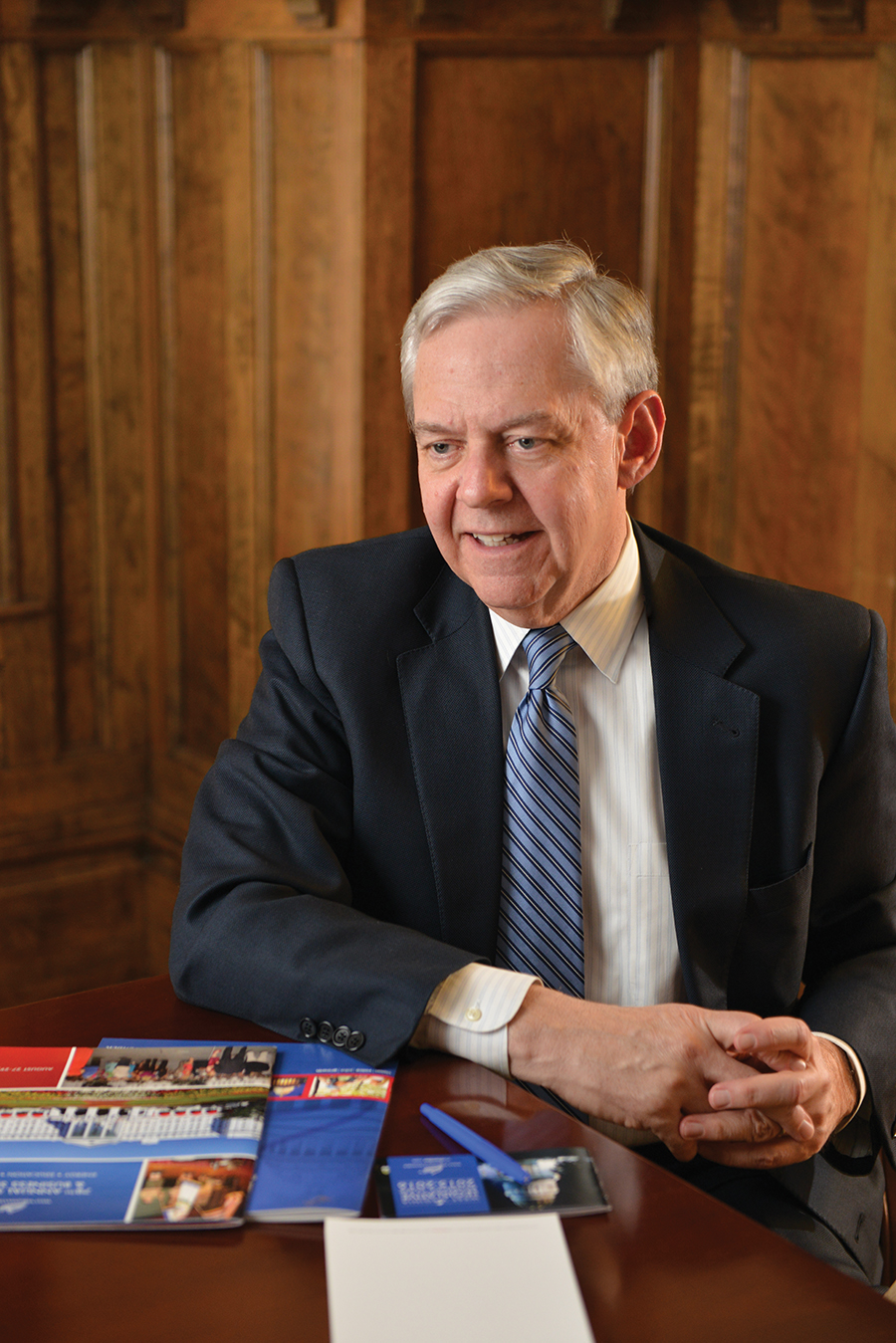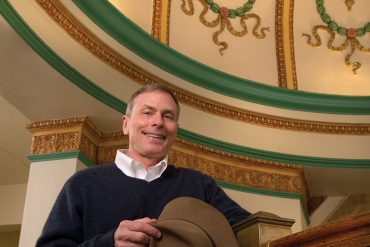A candid conversation with the longstanding West Virginia Chamber of Commerce president about education, politics, business, energy and his love of the Mountain State
Interview by Jack Houvouras
HQ 89 | SPRING 2015
Steve Roberts may reside in Charleston, West Virginia, but make no mistake about it; a part of his heart will always be in Huntington. How else can you explain that his first three hires after being named president of the West Virginia Chamber of Commerce were from Huntington? Those three hires, by the way, were Paul Mayer, Tom Boggs and current Congressman Evan Jenkins. Roberts must be doing something right – he has been at the helm of the organization for 23 years. Since he was hired, the Chamber’s membership has quadrupled and today stands at more than 5,000. And even more impressive is the fact that those 5,000-plus members employ half of West Virginia’s workforce.
One of the first children to be born at Cabell Huntington Hospital, Roberts grew up in Huntington, attending school at Gallaher Elementary, Cammack Junior High and Huntington High School before graduating from West Virginia Wesleyan College in 1978 with a double major in government and business administration. Not long after graduating, he was hired by the Huntington Regional Chamber of Commerce and rose quickly within the organization. In 1983, at the age of 26, he became the youngest Chamber of Commerce president in the United States. He served as president for eight years before accepting a position in human resources and government relations at BASF in Huntington. Three years later, the state Chamber of Commerce came calling and he packed his bags for Charleston.
Roberts is married to the former Anne England of Huntington, and the couple has three children, all born at Cabell Huntington Hospital as well. HQ sat down with Roberts on a cold February morning at his offices in Charleston for a very frank discussion about education, politics, business, energy and the future of both Huntington and West Virginia.
You were student body president at Huntington High School. Why didn’t you go into politics?
In a way, I am in politics. I respect politicians, and I respect the people who are devoted to public service. I went down the private sector path. I’ve kind of always been involved in a side business of some kind along the way.
What led you to work for the Huntington Regional Chamber of Commerce?
I liked and admired the people at the Huntington Chamber. In those days it was Bill Campbell, Frank Hanshaw Jr. and Bill Turnbull. I thought working alongside those people would be a very good career choice. I loved Huntington, so there wasn’t anything that I wasn’t willing to try to help the city or the Tri-State. I was single, so I had plenty of time to work. I worked hard.I worked long hours. There I was, a young person with a lot of energy. As somebody said to me one time, “You didn’t know it couldn’t be done.” I just had an attitude of, “Sure, we can do this,” about everything. One of the things they put me in charge of was membership growth. For two years running we had the most membership growth of any chamber in the country because we just tore it up. There was a can-do spirit. People in the Tri-State are eager to work together.
What were a couple of highlights from your time as president of the Huntington Regional Chamber of Commerce?
The first was the transition from a city manager form of government to the mayor form of government. Not everyone agreed with that, but I think it was the right decision to go to a more politically based form of government. Current Mayor Steve Williams was tapped to make things happen in Huntington at the time. Steve was doing a great job, even then. Second, we developed a plan to revitalize the central business district working with the American City Corporation. It was largely a Chamber-led effort. The American City Corporation had done great things all over the country. They had designed various aspects related to Huntington planning. And, over time, many of the things they designed have come to pass.
How would you compare the business opportunities in Huntington today as opposed to when you were president?
I think a generation ago we really had the mindset of, “Let’s be a regional headquarters city. Let’s be the regional headquarters for coal. Let’s have a strong manufacturing base.” It feels to me as though a lot of those things have changed, and maybe not for the better. The loss of the Ashland Oil headquarters was huge. When you consider at one time companies like Island Creek Coal and Arch Coal were headquartered in Huntington, those are very big losses.
What can Huntington do to rebound from those losses?
Everywhere I go in West Virginia, people are fond of Huntington. Putting a stop to crime is a high priority. After that, help us repair West Virginia’s business climate. Huntington and all the industrial towns suffered as a result of our state’s high business taxes and bad policies that kept jobs from growing here. Give us lawmakers who will support better schools, lower taxes and fair courts, and we will grow jobs in Huntington and throughout West Virginia.
How could Huntington better carry its message to the Capitol?
It was my experience that if you created an event that brought Huntington people to the Capitol, they would come and actively participate in the political process. When I was president of the Huntington Chamber, we had a “Huntington Night” every Tuesday at the Capitol during the legislative session. It was a legislative reception and members of our legislative committee attended. We also invited the entire legislature. Some of them came and some of them didn’t, but almost always the regional legislators from Cabell, Wayne, Mason and Putnam counties would be there. We averaged about 30 people at each event. Local companies sponsored the receptions – at the time companies like INCO (now Special Metals) Ashland Coal, Corbin, Owens-Illinois, ACF and various law firms. It was a real rallying event for people from the Tri-State to come to Charleston and carry their message.
How do we get Huntington and Charleston to cooperate more on economic issues instead of competing against each other?
I think the schools can play a role in achieving this. In addition, we need to find organizations that can shake hands with each other and say, “Let’s do this together.” That could be manufacturers, the chemical industry, the schools. I would love to see us do something jointly so that our futures are tied together. We need to be more intentional to make sure it happens.
How did you find your way to Charleston and your current position?
I came to Charleston in 1992 after working for BASF. BASF was talking about transferring me to New Jersey, but Anne and I didn’t want to leave the area. At about the same time, Phil Cline, who was chairman of the West Virginia Chamber of Commerce, informed the board that I was available, and so they interviewed me and hired me.
You’ve been here 23 years. To what do you attribute your longevity?
I’ve been surrounded by good people. First of all, we have a terrific volunteer base. Second, the people working here have been great. Ironically, the first three people I hired were from Huntington – Paul Mayer, Tom Boggs and Evan Jenkins. I’ve also been surrounded by a supportive board.
How do you achieve consensus on Chamber positions when you have such a diverse membership?
We start by providing information. We listen to what our members say – we take that very seriously. But in the end we have to accept that if our members can’t achieve consensus on a particular issue, then we simply remain neutral.
What are the advantages of being a Chamber member?
The Chamber of Commerce has become West Virginia’s economic development and education think tank. It also has become the networking place, the gathering place, for movers and shakers from throughout the state. The real advantage is that this is the place where the people who have the most invested in West Virginia, who care the most about its future, are gathering to try to hammer out the policies that will help our state grow into the future.
Historically, Democrats have outnumbered Republicans 2-to-1 in West Virginia. Today, the GOP controls both the House of Delegates and Senate for the first time in 80 years. To what do you attribute this change?
I think West Virginia would have moved to a more bipartisan position over time, but I think President Obama speeded that process. We have a lot of poll data that suggests West Virginians really don’t care for President Obama. His policies are not the policies that tend to be favored in rural areas. They don’t tend to be favored in energy-producing areas. They don’t tend to favor the manufacturing belt. The fact is President Obama lost every county in West Virginia. But I also think the Republican Party made a great effort to attract good candidates. For one of the first times in a very long time you had this stellar group of Republicans – Shelley Moore Capito won her United States Senate race by the largest margin in West Virginia’s history.
How do you think that will change the business climate in the coming years?
I think we’re going to move toward a very employer-friendly, education-friendly climate. The Fordham Institute has recently said that West Virginia’s laws favoring teachers are the No. 1 most union oriented in the country. I think we’re probably going to see some pullback from that. I say this with some confidence because the Legislature is planning to enact the West Virginia Chamber of Commerce’s education and economic development agenda. The reform agenda includes education reform, legal reform and election reform. I think the Legislature is already making great strides under the leadership of Bill Cole and Tim Armstead. They are going to be talking about things that previously we didn’t get to talk about.
What are the three highest legislative priorities for the Chamber this year?
No. 1 is education reform. Our students in West Virginia are, on average, scoring 48th out of the 50 states. They are scoring 48th in math and between 48th and 46th in reading. We’re proposing bills like alternative certification to allow Teach for America teachers to work here, and we’re proposing a charter school bill. No. 2 has to be judicial reform. The perception exists that West Virginia is a place where not everyone, including business owners, gets a fair trial. If we really stop to think about that, who doesn’t want everybody, rich or poor, to get a fair trial? That’s really been a problem in West Virginia. And No. 3, we need to revisit West Virginia’s tax structure. Built into our constitution is a tax on capital goods and investment. Most experts would say the thing you want to encourage most is capital investment. This result is West Virginia taxing most what we want to attract and keep most. We have to revisit that.
There is talk of West Virginia becoming a right-to-work state. Do you think this is likely with the Legislature, and what position does the Chamber take?
A right-to-work bill is pending at the West Virginia Legislature. We really have a different kind of economy today. We have to be more adroit. We have to be competitive. We have to be quicker on our feet. We could be all of these things if we become a right-to-work state. I think the likelihood is high that it will at least get consideration. The Chamber is cautious about this issue, but we’ve recently polled Chamber members on this and most of them believe that West Virginia’s overall economy would improve if we were to adopt a right-to-work law.
It was recently reported that West Virginia is the only state in America where 50 percent of the adult population are unemployed. Why do you think that is?
I think there are a lot of people in West Virginia who want to work and there are a lot of college graduates who want to work, but they can’t find jobs. We’ve had a lot of discussion with economists about this. It is shocking to many people to find out that for at least a decade the highest wages in the state were paid in Boone County, but that’s because we had coal mining. Boone County was West Virginia’s highest coal production county. A huge problem for us is that we have whole regions of the state that haven’t had any economic development and job creation in decades. I think we start by finding out why we aren’t attracting jobs and why we aren’t keeping the employers that we’ve had. Part of that is our reputation. Part of that is we haven’t taken advantage of opportunities. The unemployment rate in Mason County today is very high. It would be virtually zero if we had built the Apple Grove pulp and paper plant.
New EPA regulations combined with the natural gas boom have had a devastating effect on the state’s coal industry. Coal exports declined 40 percent in 2013. What is the Chamber doing to help the coal industry?
The Chamber is very closely allied with the coal industry. We are focused on several things. We continue to try to push the EPA to modify its position related to coal. The West Virginia Chamber has sued the EPA eight times in federal court. We are part of an alliance of pro-energy groups that are saying, “We want to live in a clean and protected environment, but we don’t want unreasonable environmental regulations that shut down industry and cause whole communities to collapse.” Interestingly enough, while coal exports are down 40 percent and coal production in West Virginia is down 60 million tons, worldwide the use of coal has increased. So the EPA saying, “We’re going to shut down Central Appalachian coal production,” hasn’t made one speck of difference in worldwide coal production. The Chinese want to live in reasonably comfortable accommodations. In India, they want electricity. They see coal as the way to do that. We can help them. We know how to burn coal cleanly. We know how to produce it cleanly. We would have huge opportunities to sell coal in China, India, Germany and Australia if the EPA would just work with us.
What is the Chamber doing to help the state diversify its economy so it’s not focused so much on coal?
First, we have to improve education and workforce readiness. Whether our young people are going for four-year degrees or entering the workforce, they must be properly prepared. As an example, West Virginia is a center for natural gas technology. In fact, in the 1960s there were more Ph.D.s per capita in Charleston, West Virginia, than any place else because of the chemical industry. We have a reputation for having technology know-how in West Virginia. The natural gas industry could be headquartered here or have regional headquarters here, but we need more geologists and engineers. Marshall’s College of Engineering can help prepare people for those careers. We need to revisit energy production. Our policies need to reflect that we want to be an energy-producing state. The combination of coal and natural gas makes us an energy powerhouse. Government needs to be open to building gas pipelines. Additionally, we can look to the Department of Defense as an anchor for all sorts of technologies in West Virginia. This is already being done in several places in West Virginia – in Morgantown and Mineral County. I’m a huge proponent of seeing Marshall University be one of the centers for this. West Virginia, for the last 20 years, has been 50th in the nation in per-capita domestic military expenditures. That has to change. I truly believe that with our universities we can partner up with the Department of Defense and have an alliance not unlike the Research Triangle Park in North Carolina. I think there are places in West Virginia where we can do much more with tourism, but we must invest in it. We have to be intentional. We are an ideal place for back-office operations for banks and insurance companies. I’m talking about well-paid positions. We haven’t done enough to attract them and keep them in West Virginia. I think in West Virginia we have demonstrated ambivalence about what we want to be. Some time or another you have to get off the fence. Do you want a future that makes you a national forest or do you want a future that allows people to live here, raise their families here and thrive here? I think we are the ideal place to do both.
How can Marshall University improve the business climate in West Virginia?
I think there’s a huge role for Marshall in many ways via the College of Business, College of Engineering, School of Medicine, the Robert C. Byrd Biotechnology Science Center and Forensic Science Center. And Marshall’s influence is not limited to the Tri-State. It’s not limited to southern West Virginia. When you’re a university the size of Marshall with the name-brand cache; when you have the reputation Marshall has; when you have the fame that has grown out of the We Are Marshall film; when you have the community support that exists at Marshall; then you have to say, “The sky’s the limit.”
What can be done by the public and private sectors to promote more small business growth and entrepreneurship in West Virginia?
Last week we gave testimony at the Small Business Committee of the West Virginia Legislature. We talked about getting government out of the way of small business. Today, if a small business has one little change in its name or one little change in its data then it has to go to six difference places to redo everything. That’s not user friendly. When I spoke to the committee I said, “I’ve never met a small business person who wouldn’t like to have more customers.” How are we going to get more customers? We’re going to get more customers by growing the base. We have to have policies that are friendly to big business because big business buys from small business and big business creates customers for small business. So, it’s a puzzle with many pieces, but they are all related. Also, nothing succeeds like a small business loan program. Banks that have engaged in small business lending have done very well. So, increasing the opportunities for small business loans will help. But the most important thing we can do is listen to the needs of small business.
Where should someone go to seek advice about starting a business in West Virginia?
I think the local chamber is the best place to do this because it’s the friendliest place for the small business. But, I understand the local chambers need the resources to do it. I think it’s the West Virginia Development Office that needs to help seed that and make it happen. I believe the West Virginia Development Office should be working with the local chambers to see that the SCORE (Service Corps Of Retired Executives) chapters are populated. This is a place where entrepreneurs and small business owners can go for advice from seasoned business executives. The mistake I think we’ve made is thinking that the colleges and universities will do some of this and the state will do some of it. That has left the local chambers to pick up whatever is left. But, the colleges and universities and the West Virginia Development Office all get tax money, and they need to be more willing to share that with the local chambers.
We’ve talked a lot about the problems in our state and the mistakes we’ve made in the past. What are we doing right in West Virginia?
Changing the politics and having competitive elections. One definition of insanity is to keep doing the same thing and expect a different result. Let’s elect good people. From good politics comes good policy.
What is the one thing we need to move West Virginia forward?
Attitude. We have to believe in ourselves a little more than we do. I think we need a new vision of what we want for the future. One example that should be near and dear to the hearts of many of your readers is to take another look at a regional airport. I think there’s more and more realization that without a mid-sized airport you’re just at an economic disadvantage.
Regarding the future, what would you like to see occurring in West Virginia in the next 25 years?
We have got to move from almost last place in education achievement. Period. Nationally, we spend near the top in education but are near the bottom in results. The future belongs to the educated. We’ve got to focus on getting there.
You obviously have a passion for Huntington and the state. Why?
It’s wonderful to live in a place you love and to promote a place you love. I love Huntington. I love West Virginia. I’m a big proponent of, “When you have a great story to tell, shout it.”
When you retire someday, what would you like to be remembered for?
I really think that my entire career campaign has been about how you can have a friendly business climate and still be good to people. I hope that we have found a way to strike a balance. I hope we will have helped individuals and families to prosper. In the end, everybody wants the opportunity to make a living and have a shot in life. Finally, I think most of us want to make sure that the most disadvantaged people in society still have somebody rooting for them.





